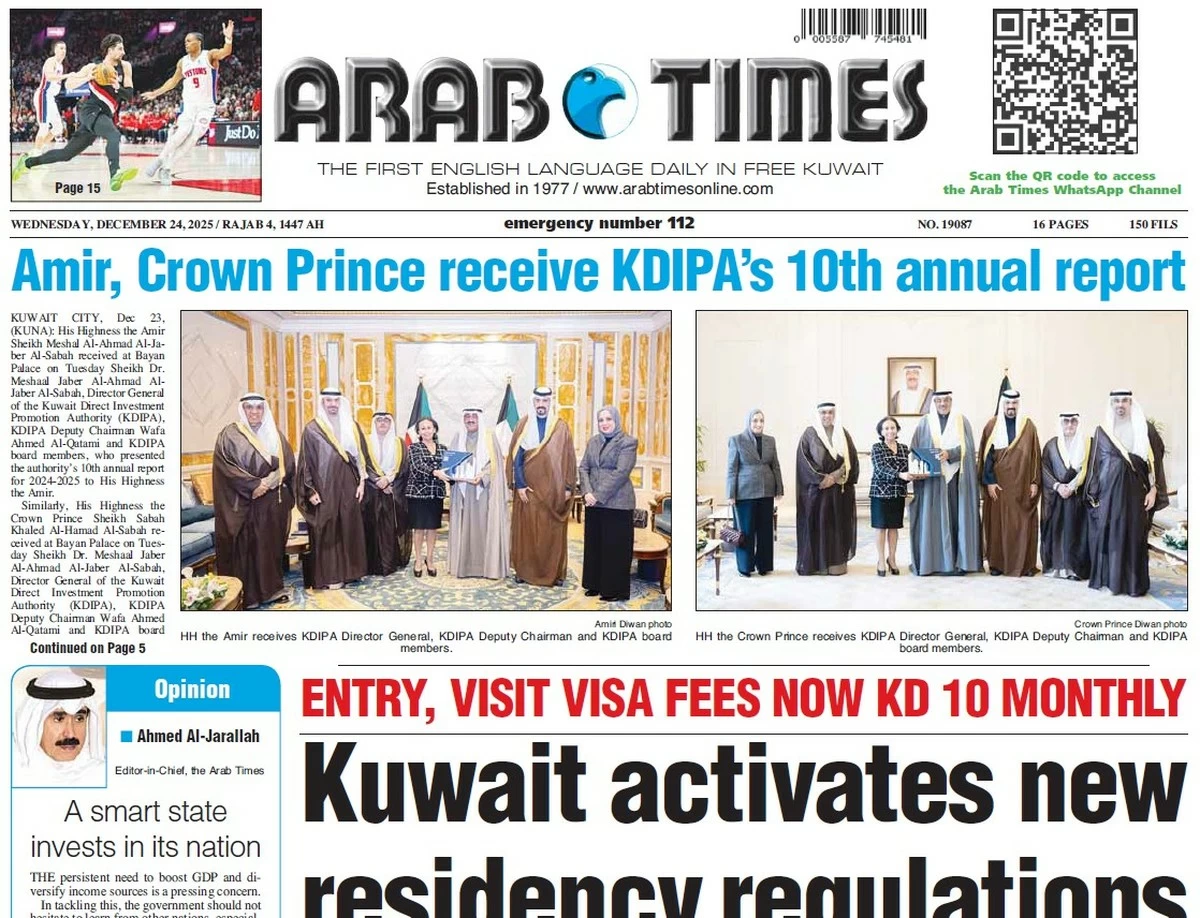10/10/2020
10/10/2020

‘THE two former deputies, Dr Abdullah Al-Nafisi and Obaid Al-Wasmi, announced that they handed over to His Highness the Amir Sheikh Nawaf Al-Ahmad Al-Sabah on Wednesday of the week before the last when HH was the Deputy Amir and Crown Prince – the ‘Kuwaiti Document’, which included the authors’ depictions of the country’s reality and ways to address it,” columnist and professor Dr Abdullatif Ben Nakhi wrote for Al-Rai daily.
“But observers have suggested that it is more like an electoral material that will be employed for the benefit of specific candidates, including former MPs who need to obliterate their association with the thieves of public money and sponsors of sectarianism, who were referred to in the preamble of the document.
“However, I consider the title of the document fake because it was not prepared through national dialogue sessions, and the version circulating – which was published by some people close to the two doctors – is full of shortcomings because it is not consensual in the wording and content, from the perspectives of the authority and large segments of the people, but rather includes provocative passages and references to both.
“With regard to the authority, the preamble of the document may be the first provocative clip, because it is offensive and showcasing similar to what is usually presented during election seminars, and what was proposed by the Arab Spring movement, so it will not contribute to restoring the confidence of the political power.
“While the second provocative aspect, is the call for reforming the judiciary in a fatal manner and the political power is likely to consider this demand to consecrate the campaigns aimed at destabilizing the confidence of the people in the judiciary, given the fact these campaigns were denounced by both His Highness the late Amir and His Highness the incumbent Amir through their sublime speeches that were delivered by them prior to handing over of the document in question.
“As for the popular perspective, the document is burdened with provocative aspects and demands of large segments of citizens, and the first of these aspects is the person who sponsored the document – Al-Nafisi and Al-Wasmi – in terms of compatibility with some of the national demands contained in the document, such as ‘maintaining the stability of society’.
“In this context, Al-Nafisi made many provocative statements towards a wide spectrum of society, including his statement years ago on a sectarian Satellite TV Channel.
“With our full respect for his right to freedom of belief, we consider that through these statements he has lost his eligibility to take the lead in any national project for reform or reconciliation, while preserving his right to participate in it.
“As for Al-Wasmi, we thought that he shared the opinion of Al-Nafisi, especially after his famous angry speech in February 2012 elections against a candidate whose election headquarters was burned down after the speech, on the background of an implicit insult that was issued by the relevant candidate against his tribe, but it was proved that he (Al-Wasmi) is like Al-Nafisi in terms of their double standard attitudes, principles, and national values.
“The other provocative matter in the document is the demand to close the ‘file of prosecutions and pursuing political prisoners’ without any reference to those who are condemned due to their involvement in other cases such as that related to the freedom of expression and state security cases.
“This happened although they were still present and in circulation throughput all of the various phases of good offices that were aimed at endorsing general amnesty during the recent year and in spite of the existence of some local amnesty precedents that were issued in favor of some people who were convicted for their involvement in ‘opinion’ cases and in cases against the State Security that included possession and ‘use’ of weapons and explosives.
“What is meant is that general amnesty projects require national consensus, otherwise they will have negative repercussions on their goals, such as national cohesion. Contradictory opinions about a general amnesty must be presented and discussed in a transparent and objective manner.
“The document also includes an implicit questioning of the integrity and fairness of the judiciary, and an explicit demand to ‘reconfigure the judiciary, its operating institutions, organs, courts and litigation procedures’.
“However, at the same time it ignored the allegations of sympathizers with the Al-Abdali case convicts, and their claim that there are violations that permeated the investigation procedures and defects. A number of evidence was marred and I am not evaluating their conviction procedures and sentences, but I deplore the duplication of the document towards court rulings.
“In conclusion, I invite the authors of the document to add a paragraph in it about the guarantees – that they provide to the authority and the people – to prevent the targeting of state institutions and trust in them, if their demands were adopted and resulted in a political reality that is not in their interest.”
Also:
“Kuwait is distinguished as a democratic state based on a Constitution firmly established in the people’s conscience,” columnist Dr Hamad Mohammad Al-Matar wrote for Al-Qabas daily.
“However, the birth of the Constitution coincided with the birth of a modern state of institutions, and whoever follows the stages Kuwait went through, whether before the Iraqi invasion or after liberation, discovers that every political problem resulted in the final outcome, either from complacency in implementation will eventually observe that every political defect, has resulted either in leniency that has been shown in terms of the actual application of the Constitution or due to non-respect for the same during actual practices and political actions.
“There is no need for us to say that the actual implementation of its provisions and respect for it in form and substance is the basic guarantee for the advancement of Kuwait and the resolution of most of the outstanding issues.
“The government in Kuwait has agreed since independence that there should be a constitutional document that regulates the relationship of the ruler with the subjects, and regulates the work of the authorities and institutions, and makes the state a state of law based on the principles of democracy, the spread of freedoms and respect for the opinion of others, and thus the relationship of governance with the people is documented in Kuwait and this is the most important relationship.
“In other words, this relationship, respect and loyalty should be based on solid foundations, and this makes it imperative for everyone to respect the constitution and abide by the laws, and in the event there are any amendments to the Constitution, they must be towards more freedoms, and towards confirmation of the principle of separation of powers, in a way that achieves the development of the state of justice, freedoms and popular gains.
“Recently, the Kuwait Document, presented by the two former MPs, Dr Abdullah Al-Nafisi and Dr Obaid Al-Wasmi, to His Highness the then Deputy Amir and Crown Prince Sheikh Nawaf Al-Ahmad, included the formation of a national salvation government with expanded powers whose program is to fight and eliminate corruption, and to approve a national strategy for the sustainability of state resources.
“Likewise, the document called for restructuring the judiciary according to international standards, preserving the stability of society and the state by closing the file of prosecutions and political prisoners, and agreeing on an electoral system that reflects true popular representation.
“These points, as a whole, reflect a real desire to return to the spirit and purposes of the constitution, which we think that Kuwait would not have reached the way it has, in terms of bad governance in some aspects of administration, and widespread corruption, had there been a real implementation of the provisions of the Constitution, and was keen to apply the law to everyone, without exception or favoritism.
‘‘Catalyst’ – The Document of Kuwait + the Constitution of 1962 = Homeland Rescue.”
— Compiled by Zaki Taleb


